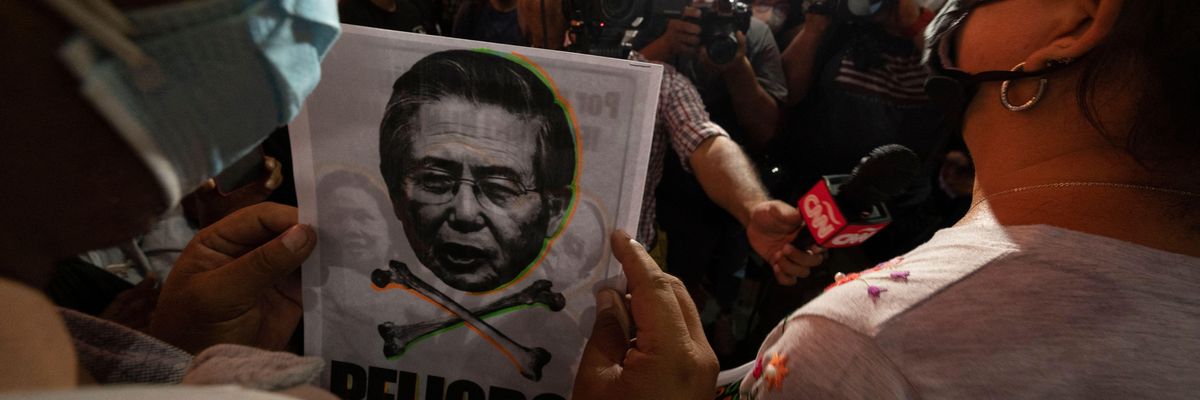Protests erupted in Lima on Thursday night after Peru's top court ordered the early release of neoliberal former dictator Alberto Fujimori, who has been serving a 25-year prison term for crimes against humanity.
With its decision on Thursday, the Constitutional Tribunal--whose makeup has become more friendly to Fujimori in recent years as a result of new appointments--reinstated an earlier pardon that had been struck down.
As Reuters reported:
Fujimori, 83, was initially pardoned on Christmas Eve in 2017 after 10 years in jail, a decision that was overturned a few months later after the intervention of an international court on the grounds that it had been irregular.
The latest ruling opens the door for the pardon to be questioned once more in the Costa Rica-based Inter-American Court of Human Rights--although a new decision could take months, said Jo-Marie Burt, a senior fellow at the Washington Office on Latin America.
According to Al Jazeera, "Judges voted 4-3 to free Fujimori. It was unclear when Fujimori could leave prison or if new legal challenges could halt the decision."
The new ruling provoked demonstrations against Fujimori, who had been sentenced to serve until 2032 for human rights violations committed when he ruled the country between 1990 and 2000.
Peruvian President Pedro Castillo--a socialist who was a rural school teacher before he defeated Fujimori's daughter Keiko last year--tweeted Thursday that "the international justice bodies to which Peru is attached must safeguard the effective exercise of justice for the people," an apparent reference to the Inter-American Court.
Keiko Fujimori, part of the Andean nation's wealthy elite, had vowed to pardon her father if she won the presidency. Alberto Fujimori's human rights abuses include the massacre of farmers by a military death squad during his administration and the forced sterilization of Indigenous women. The former autocrat, who ordered the military to dissolve Congress and rewrote the Constitution, was also charged with corruption.
Burt told Reuters on Friday that "the organizations that represent the victims in Peru have already called upon the [Inter-American] Court to have a meeting and to review this decision... they actually filed the request yesterday."
As the news outlet noted:
Fujimori was pardoned in 2017 by then-President Pedro Pablo Kuczynski, a former Wall Street banker who at the time needed congressional support to survive an impeachment attempt.
Videos later showed that representatives for Kuczynski had lobbied part of the Fujimorista Popular Force bloc in Congress in an apparent attempt to swap votes for Fujimori's pardon, fueling the uproar over the decision to free him.
Human rights groups took their challenge to the Inter-American Court of Human Rights, which ordered a local court to revise the decision.
The local court decided the pardon was null and Fujimori returned to prison after being free for about nine months.
Burt expects the Inter-American Court to issue a similar decision in this case.
Earlier this week, Peruvian lawmakers passed a motion to impeach Castillo over allegations of corruption, which he denies.
"Peru is going through an institutional crisis without precedent," Castillo said in a lengthy speech given in response. "We will send to the Congress of the republic a set of reforms that will allow us to overcome this structural crisis."

